
At first glance, Greg Cope White does not give off the vibe of what you might think a former U.S. Marine should present. Long hair, stylish round glasses and a warm, witty personality makes him more bon vivant than Jarhead. But back in 1979, at just 18, White headed off to boot camp, more on a lark to follow his straight best friend for what he assumed would be some summer fun. Barely out of puberty, White couldn’t run a mile, and was hiding a huge secret — his sexuality. The likelihood of him making it through the six weeks was slim, to say the least. But in his new memoir, The Pink Marine: One Boy’s Journey Through Boot Camp to Manhood, White chronicles his boot camp experience and how it fundamentally changed him. Currently a host on the Cooking Channel’s Unique Sweets, (“I served my country for six years, and now serve up pie on television”), White has spent the last thirty years working in Hollywood as a writer and producer, which explains a foreword written by his former boss Norman Lear, and book jacket blurbs from the likes of David Hyde Pierce, Margaret Cho and Jane Lynch. In a post-“Don’t Ask, Don’t Tell” world, decades after he finished serving, White is still profoundly impacted by those six weeks, and credits them with making him not only a better man, but a better gay man.

Queerty: For gay men it appears military service embodies a duality — particularly before the repeal of “Don’t Ask, Don’t Tell” — where experiences like boot camp invoke such a homophobic yet homoerotic culture all at the same time.
As a gay person that is in the situation, you’re handcuffed, and not in a good way, because we are asked to do a job, and the most important thing I could do, because I was serving my country and I was getting paid to do it, was do a good job. You are always super conscious of violating, obviously the trust of anyone, because if you do it on the clock you’re doing a bad job. The Marines especially, has this image, this hyper-masculine, super macho image of men, and that there’s nothing better. Look I’m gay, I like the best, I like the upgrade. I wasn’t going to be in the Army. But there’s definitely a lot of homoeroticism, especially in the Marines.
One of your trainers in boot camp used to like to say “fuck ‘em with the whole dick.” So that’s very provocative and not exactly P.C., and could be seen as creating a hostile work environment. But there’s the work environment, and then there’s the Marines. How as a gay man did you take that statement — no pun intended.
How about we take this to the next level?
Our newsletter is like a refreshing cocktail (or mocktail) of LGBTQ+ entertainment and pop culture, served up with a side of eye-candy.
“Fuck ‘em with the whole dick” is such a useful phrase. It’s a great reminder about anything I want to do. Commitment, me getting a point across, or even sex. All the comments that were made, I mean I was called a faggot, and when you’re gay and called a faggot, it’s stings and rings a little harder than if you are completely straight. If I was a straight guy, and somebody calls me a faggot, who cares? It’s not a name that sticks. But when you’re guy and they are calling you that name, it hurts. But for me when I would hear sexual terms, or sexual words, like “you’re the kind of guy who would fuck him up the ass without a reach around,” I’m imagining that scene.
 You were very young when you went into the Marines…
You were very young when you went into the Marines…
I turned 19 in boot camp.
When you were in boot camp did you think this is the worst decision of my life?
I really didn’t know what I was doing. My best friend, and we’re best friends to this day, he spent a year at the Air Force Academy, but his vision got too bad to become a pilot, but he still had to fulfill his military commitment. So to be a Marine, you always have to go through Marine boot camp. You can have 20 years in the Army but you have to go back to basic training. We had just finished our freshman year of college, and he told me he was going off to Parris Island (the Marine Corps’ Recruit Depot in South Carolina), for the summer, and he said I’ll be back in time for my sophomore year of college. And all I heard was “summer” and “camp.” And it’s easy to look back now and think, “wow, that’s so naïve,” but that’s really what I heard. No one in my family had been in the military, I didn’t play Army as a kid — clearly I violated my G.I. Joe doll — but the fact is I didn’t know what I was doing. I had about three weeks before we shipped out. As I talked to more people, and they told me I was crazy, including my best friend, never (did people talk) about my sexuality, always about the fact that I couldn’t keep up physically. I was not a fit kid.
 And you were little, right?
And you were little, right?
Tiny! I was about five foot eight, and I weighed one hundred eleven pounds. I failed the physical when I went down to enlist…based on weight. I always suspected that they were failing me because they suspected I was gay. So I ate as much as I could for a week. There’s a really funny section (in the book) where I gained three pounds in an emergency just to get me in. it was then that it started hitting me what had I done. It got real.
You were in the Marines for six years. What took you from summer camp to staying in the service so long?
Well, that was the service contract I signed. I did shake it up a little bit. About a year into my service I was approached about going to Officer Candidates School. And my career path at the time was law school after undergrad. And so I thought I would do that, and I did go to Officer Candidates School, and it was a great perspective, to know the leadership side of it, and then I decided not to go to law school, so I resigned my commission and finished my time as a sergeant.
 It’s been almost 30 years since you were in the Marines. Do you have any connection to your life as a Marine to the life you have now as a pastry chef on television?
It’s been almost 30 years since you were in the Marines. Do you have any connection to your life as a Marine to the life you have now as a pastry chef on television?
Every day I use things that I learned (in boot camp) and the structure that I built. I grew up in a society that told us our basic nature was wrong. It was really difficult for guys of our generation to gain any self-confidence. And we had to take that silently, there was no discussion about it. Everybody said, “you’re wrong, we don’t like you, we don’t want you, there’s no place for you in society.” Also, physically I didn’t match anything that fit the ideal of masculinity. I didn’t have a hairy chest, I didn’t have a deep voice, I didn’t need to shave. I looked girly! I wanted the mustache, I wanted to look like The Village People. And because I didn’t feel like I fit in, how in the world I ended up going into the Marine Corps to find myself there? I did though, and I found my fit. They gave me confidence, regardless of my sexuality. They had a job to do too. Those drill instructors had to make me into a killing machine. And in order to do that, they have to do that to everybody.
 Once you found yourself in the Marines, it seems like you had a very welcoming, supportive group of brothers in arms.
Once you found yourself in the Marines, it seems like you had a very welcoming, supportive group of brothers in arms.
Brothers in arms, it’s fantastic. I felt that camaraderie from about week one. When you’re in boot camp, it’s a little bit us against them, all the recruits against the staff. We always tried to do well and impress our leaders.
You served in relatively peaceful time, so you never saw active duty, and you never served abroad. Do you think your experience would feel different now if you served in a war zone?
I think my PTSD would be measurable. I feel horrible for those guys coming back, not just for the burden that they are carrying, but the treatment that they get when they are back.
So I’m thinking of Private Benjamin (the 1980 Oscar-winning comedy starring Goldie Hawn as a privileged society girl who joins the military). How accurate was the boot camp experience in the movie, and were you Judy Benjamin?
Private Benjamin was really accurate. My boot camp experience, I wanted to develop the characters so you would get to know the people the way you got to know the characters in Private Benjamin, because there were such great people! My Bunkie, the little suck up, the crazy guy, the illiterate guy, the fat guy that lost the weight, they were such great people. People I can still see their faces as I tell their story and I’m flashing back to their big personalities. I didn’t enjoy the second half of Private Benjamin where she went off to serve, but the boot camp part was great. The most accurate depiction of boot camp was (Stanley Kubrick’s 1987 film) Full Metal Jacket for sure.
So in your mind what was your biggest surprise in boot camp then, and as you were writing your memoir so many years later?
I’d forgotten that my biggest fear when I went in was that I’d be kicked out. I’d forgotten until I started telling all my stories that not only didn’t I get kicked out, but like eight others guys got kicked out. Some couldn’t keep up physically, one couldn’t read or write, one guy was crazy, and one guy we sort of helped leave because he was an asshole.
You were in boot camp with your best friend. Do you think you could have made it without him?
No. Had we been separated, I can’t even imagine. I relied on him so much. I needed to look at him. We lived across the squad base across from him. But sometimes I didn’t want to look at him, because he would make me laugh.
Do you think he needed you to make it?
My biggest worry was I was a burden. He helped me gain weight, and he gained 18 pounds in the process, so he came in with a rock around his neck. I was worried that someone was going to find out about my sexuality, and accuse him of either being gay, or knowing about me being gay—which he did—and getting in trouble.
What’s your biggest takeaway from Boot Camp?
We can do anything. You think you can’t take one more step? You can. Whether you’re not wanting to get early in the morning to take a flight, or whether you don’t want to finish a project that’s due the next morning, or you’re too tired and you just can’t, well you can, no matter what your age is. You can take one more step.
If you’re a better man because of boot camp, are you a better gay man because of the Marines?
Yes, because they let me know I was OK, and that I had value as a citizen. I got to do a job and I was competent in their eyes. It’s almost like they ended up putting a stamp on me — you’re OK. They didn’t want to know about my sexuality, because they didn’t care.
Did you have an emotional reaction when Don’t Ask, Don’t Tell was repealed?
Yes. The first feeling I had was regret for all the people that got drummed out. I thought what a waste of all these people’s lives. But of course as soon as I got over the regret, I thought of all the great people that would benefit, that would be able to serve openly.
So a little gay guy who weighs 110 pounds wet comes up to you and says, “I’m thinking about joining the Marines.” What do you say?
Do it! Especially if he doubts if he will be accepted, and if he doubts he can make it through it. Do it.
Watch Greg get props from none other than Betty White below.







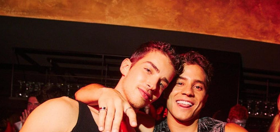
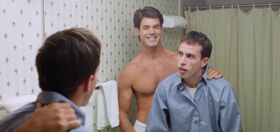
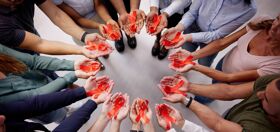

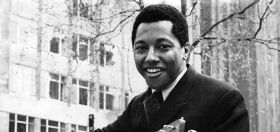
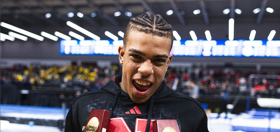
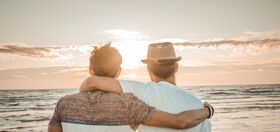



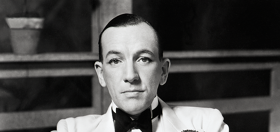
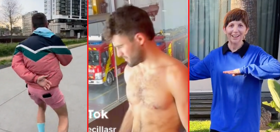
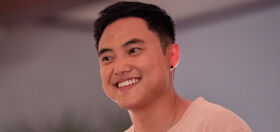

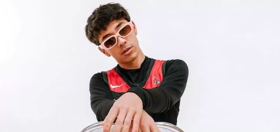
crowebobby
This had me at “follow his straight best friend for what he assumed would be some summer fun,” which I find hilarious; I’ve bought the Kindle version. I’m pushing 80 and escaped the draft by checking the box that asks if you’ve ever had any homosexual experiences. I was homeless and pretty butch looking when I arrived at the draft board, so the psychologist seemed a little dubious till I told him I had worked in a drag club (I was a “male” dancer, not in drag, but they didn’t have to know that). At one point he asked me if I wasn’t afraid of picking up a cop and I told him I didn’t go with anyone old enough to be a cop, which caused a suppressed smile. (I wasn’t being “in your face,” just callow.) From then on he was perfectly friendly, telling me there would be coffee and doughnuts on the way out if I wanted them. I had decided not to go because one: they didn’t want me, so fuck them, and two: because I was working for a career as a dancer and two years lost would have been about the same as ten years. (There was no war on.) Still, I was suddenly depressed by the idea I was missing out on a universal experience of my generation. I knew 2 months of that experience would have had me kicking and screaming to get out, but I was still separating myself even further from the norm. White’s experience may be a bit of window as to what I missed. And it sounds like a good read.
GayEGO
Well I was in the Navy which brought me out while I was in the U.S. Navy School of Music in Washington, D.C. in 1960. I made my major instrument the flute so I could have shore duty as I wasn’t keen about being on a ship, I was on U.S.S. Black, DD-666 destroyer in Long Beach, California before I was transferred to Washington D.C. Originally from Boise, Idaho, I always knew I was attracted to the same gender, and I met other gay sailors in Washington, D.C. I was transferred to the First Naval District Band in Boston in 1961 and I met my lifetime partner of 54 years at a gay bar called “The Punch Bowl” in Boston, 1962. I received an honorable discharge in 1963 and worked in the computer industry as a programmer until 2008. Massachusetts passed same-gender Marriage in 2004, so we got married on June 10, 2004.
I remember being harassed in the Navy because I played the flute, a feminine instrument, but I learned to deal with it. Our band was paid extra because there was not much living space in our unit so we got apartments. I called my partner a roommate back then and because the sailors in the band were gossiping about me, I brought him in to a rehearsal so they could meet him. That seemed to quiet them down except for one sailor, a trombone player who was from Missouri who still harassed me. One day in front of everyone, he reached for a cigarette in my jumper pocket, I screamed and said he tried to pinch my tit. His face turned beet red and afterwards he apologized and never bothered me again.
scotty
nice article. Thank you for your service. i wasnt military but my moms side of the family was. i will read your book. very interesting subject and point of view. i look forward it. thanks again. cheers!